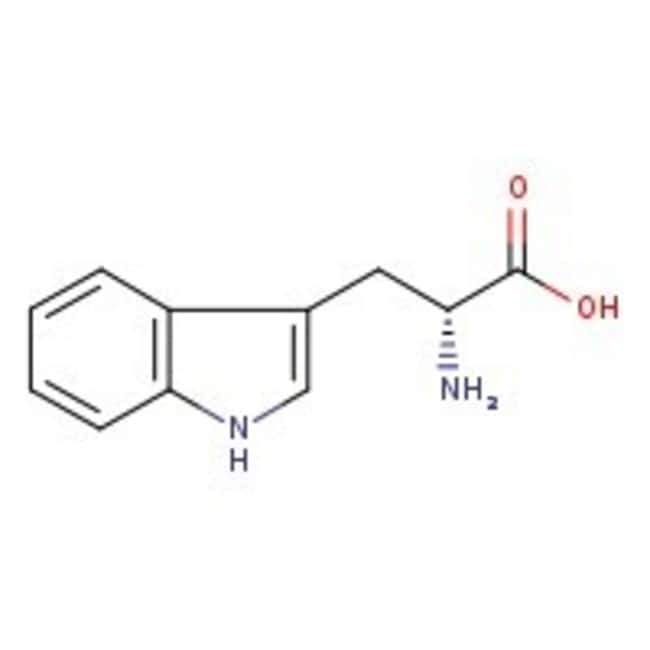Search Thermo Fisher Scientific
Thermo Scientific Chemicals
D-Tryptophan, 99%
Catalog number A18426.14
also known as A18426-14
Price (USD)/ Each
136.00
-
Quantity:
25 g
Price (USD)/ Each
136.00
D-Tryptophan, 99%
Catalog numberA18426.14
Price (USD)/ Each
136.00
-
Chemical Identifiers
CAS153-94-6
IUPAC Name(2R)-2-amino-3-(1H-indol-3-yl)propanoic acid
Molecular FormulaC11H12N2O2
InChI KeyQIVBCDIJIAJPQS-SECBINFHSA-N
SMILESN[C@H](CC1=CNC2=CC=CC=C12)C(O)=O
View more
Specifications Specification Sheet
Specification Sheet
Assay (Non-aqueous acid-base Titration)≥98.5 to ≤101.5%
Optical Rotation31.0 ± 1.5? (C=1 in water)
Appearance (Color)White to cream
FormPowder
Identification (FTIR)Conforms
D-Tryptophan is used for human embryonic kidney cell (HEK-293, ATCC: CRL-1573) culture. The product is a sweetener used to study the release of incretins from enteroendocrine cells triggered by sugar but not by sweeteners.
This Thermo Scientific Chemicals brand product was originally part of the Alfa Aesar product portfolio. Some documentation and label information may refer to the legacy brand. The original Alfa Aesar product / item code or SKU reference has not changed as a part of the brand transition to Thermo Scientific Chemicals.
Applications
D-Tryptophan is used for human embryonic kidney cell (HEK-293, ATCC: CRL-1573) culture. The product is a sweetener used to study the release of incretins from enteroendocrine cells triggered by sugar but not by sweeteners.
Solubility
Soluble in 0.5M hydrochloric acid (50 mg/ml), water (11 mg/ml at 20°C), hot alcohol, and dimethyl sulfoxide. Insoluble in chloroform.
Notes
Keep container tightly sealed. Store in cool, dry conditions in well sealed containers. Incompatible with oxidizing agents.
D-Tryptophan is used for human embryonic kidney cell (HEK-293, ATCC: CRL-1573) culture. The product is a sweetener used to study the release of incretins from enteroendocrine cells triggered by sugar but not by sweeteners.
Solubility
Soluble in 0.5M hydrochloric acid (50 mg/ml), water (11 mg/ml at 20°C), hot alcohol, and dimethyl sulfoxide. Insoluble in chloroform.
Notes
Keep container tightly sealed. Store in cool, dry conditions in well sealed containers. Incompatible with oxidizing agents.
RUO – Research Use Only
General References:
- Yukihiro Fujita.; Rhonda D Wideman.; Madeleine Speck.; Ali Asadi.; David S King.; Travis D Webber.; Masakazu Haneda.; Timothy J Kieffer. Incretin release from gut is acutely enhanced by sugar but not by sweeteners in vivo. American Journal of Physiology - Endocrinology and Metabolism. 2009, 296 (3), 473-479.
- Daniela Vullo.; Alessio Innocenti.; Isao Nishimori.; Andrea Scozzafava.; Kai Kaila.; Claudiu T Supuran. Carbonic anhydrase activators: activation of the human isoforms VII (cytosolic) and XIV (transmembrane) with amino acids and amines. Bioorganic & Medicinal Chemistry Letters. 2007, 17 (15), 4107-4112.

